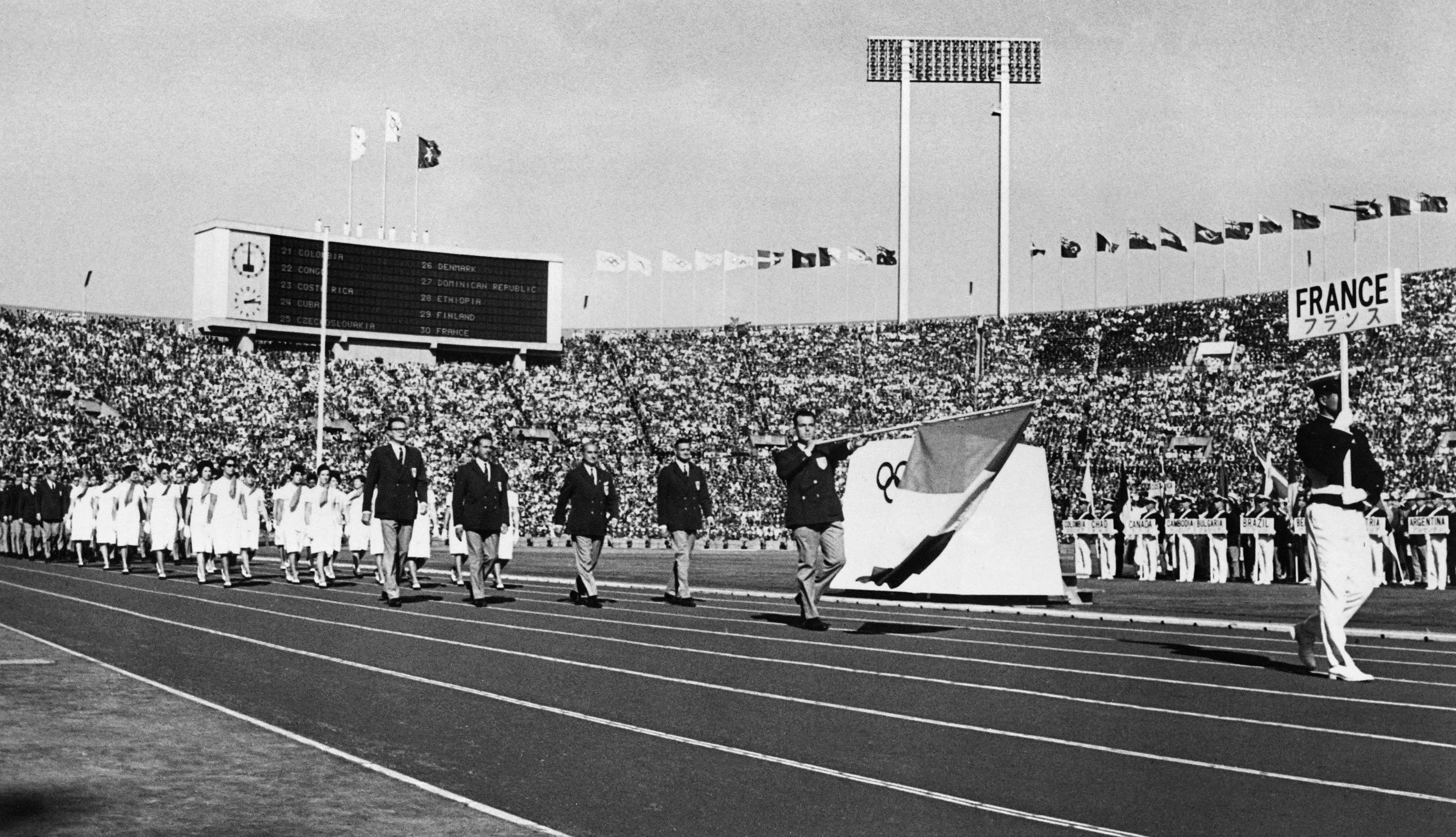The one image of the 1964 Tokyo Olympics that has stuck on with Nobumi Hiramatsu is that of Věra Čáslavská, the Czech gymnast who took home several golds and a silver. Hiramatsu was 15 at that time, and every morning at school, his classmates would gather to talk excitedly about Čáslavská’s performances from the previous night. Hiramatsu watched her perform on his family’s black-and-white television set, while most of his friends watched the games on their new color sets. On some days, Hiramatsu could catch a glimpse of the games in vivid colors while passing by electronic stores.
“We all discussed the tally of medals that we read in the newspapers, and the medals that Japan was winning. The mood of the Japanese fluctuated daily, seeing the daily fluctuation of the tally. But Čáslavská was the center of the conversation among my friends. At that age, all I could think about was this beautiful woman who was doing amazing things on the floor,” reminisced the 72-year-old retired human resources officer, who now alternates his free hours between working at a local library and teaching Japanese to foreign residents.
Those 1964 games were meant to symbolize something of a rebirth for Japan, which had been denied its status as host nation for the 1940 Olympics, owing to its invasion of China. Two decades after nuclear bombs were dropped on Hiroshima and Nagasaki in 1945, the games were sold as an important step in Japan’s post-war reconstruction. Tokyo was not only the first Asian city to host the games, but also the first where international, color telecasts were possible without transporting tapes overseas. The shinkansen (high-speed train) connecting three major cities in Japan began operations days before the commencement of the games. It was a way for Japan to showcase itself to the world.
Hiramatsu remembers something else, too: The once-flat city of Tokyo was suddenly filled with concrete ribbons of roads constructed in the air. There were other searing impacts of the games on the environment and people living on the margins of the society—a fraction of which is chronicled in the opening scenes of the lyrical documentary Tokyo Olympiad, which was made by a production staff of 556 people, with 104 cameras and 41 recording machines. Instead of buying land to build a monorail to connect the Haneda airport to the city, it was built with landfill dumped over rivers, canals, and sea. Local fishery permits were revoked, fishing jobs were lost, and a seaweed breed disappeared. Organized crime via yakuza gangs were steering construction firms; construction of other highways over water killed fish, stagnated water, and gave rise to biochemical sludge. People were forced to leave their homes to make way for the Olympic stadium; 200,000 stray cats and dogs were killed by suffocation.
Hiramatsu doesn’t share the same enthusiasm for the Olympics in 2020 as he did in 1964. The 2020 Tokyo Olympics began this week amid much controversy and during an ongoing pandemic. “How can there be world-class games with no real audience?” he remarked, referring to the recent ban on spectators during the Games across the 43 venues; overseas spectators were already banned from entering Japan.
With the pandemic still raging into 2021, the Tokyo Medical Practitioners Association appealed for the Games to be cancelled, citing stretched medical capacity for this possible super-spreader event; 450,000 people have signed an online petition with a similar demand. In June this year, a survey had found that 86 percent of people in Japan were concerned about a rebound of COVID-19 cases in Tokyo if the Olympics were to take place as scheduled. Nearly half of those surveyed felt that the games should be held without spectators; a third believed that the games should be canceled altogether.
Vaccinations against the virus began in Japan in earnest only in May this year; so far only 30 percent of Japan’s population has received the first dose of the vaccination and only 18 percent have been completely vaccinated. Government officials have claimed that 70 percent of Japan’s 36 million elderly population would be fully inoculated by August. With billions of corporate revenue riding on the games, the Olympics torch has made it through Japan’s streets, albeit amid squirt-gun protests. “We were united as a country during the 1964 Games; the Games have now divided us,” Hiramatsu quipped.
Seventy-six-year-old Hiroko Mori is feeling a little less pessimistic about the 2020 Games. He was delighted to see a photo of Japan’s most notable gymnast, Takashi Ono, in the local newspaper Yomiuri Shimbun last week. For Mori—who remembered photos of Ono’s body contours flooding newspaper pages in 1964—this summer has the potential to bring back memories of youthful exuberance for Japan’s elderly, which make up 28 percent of the population.
Mori fondly recalls the excitement about the Venus de Milo statue coming into Kyoto from the Louvre during the 1964 games. “I went to see it with my friend; we were not excited about sports, but more about a statue coming all the way to Japan by sea!” Mori remembers, adding that the opening ceremony of the games, which unfolded under a blue autumn sky and with much fanfare, added to the grandiosity of the athletes walking in with the flag of their countries. “Everyone looked happy. At that moment, even Japan’s rival countries like the U.S. and Russia were walking together. Some countries had big contingents of athletes, while there were many countries with just one athlete representing their country. I had not known the names of many countries,” she said.
Hideo Nakajima, 80, remembers vividly the glowing red flame of the Olympic torch. He was a 22-year-old university student in Tokyo, who had hustled his way into securing a job as a driver for the camera crew filming the global event. He could not watch any of the matches at the stadium. Instead, he had the first glimpse of history in the making: he watched all the rushes of the day’s recordings across the 20 days of the games. “I was surprised how powerful the cameras were, to be able to capture the red flame of the torch from such a distance,” he said, while drawing an image of the torch in my notebook.
Nakajima—who later worked as a travel consultant and retired as a mason after 33 years, and has coached local soccer teams in Saitama north of Tokyo—had his tiny moment under the sun during the games: When he was sent to fetch film urgently, a police vehicle with the siren escorted his van, so that he could make it back to the stadium on time. But then he remembers another: shaking hands with Abebe Bikila, the marathoner from Ethiopia, who went on to win a gold, repeating his performance from the previous Olympics in Rome.
But it was Japan’s women’s volleyball team, which added the final gold medal to the host country's tally, that enthralled the Japanese audience. Volleyball was making its debut at the games that year; the team had earned the sobriquet “Oriental witches” because of their consistent wins. “The Japanese women were smaller in size than their U.S. and Soviet counterparts, but they had invented new ways to receive the ball, rolling, and even somersaults,” Hiramatsu remembered.
Though Hiramatsu nursed a life-long fascination about Čáslavská—right from her political activism to her tumultuous personal life—he feels that the spirit of the Games is lost today, and that it needs a reset button. “[Pierre de] Coubertin wanted the Olympics to be a global sports festival wherein everyone competes equally. In 1964, we saw that. But today? All I see is big money being played with. Some countries cannot send their athletes to Tokyo since they have not had enough time to prepare for the games, owing to the pandemic. So the games this year are quite unequal,” Hiramatsu said, adding that the games taking place within a bubble defies the cultural exchange that’s meant to be synonymous with their undertaking. “Also, I hear there will be video games at the 2024 Olympics in Paris? Maybe only people with big hands can compete!”
Prior to the pandemic, Mori had been preparing herself to help foreigners who might be coming into Tokyo, “as my duty of being a citizen of the host country.” Now, she is questioning the larger significance of the games, even as she continues to restrict her movement in public spaces, in spite of being vaccinated. “There are no celebrations, and this is starkly in contrast with what the Olympics is about,” she said.
The mood surrounding the arrival of the 2020 games was perhaps best summed by Nakajima: “usuii miso shiro” [“flavorless miso soup”].
Thanks to Takashi Kitano for interpreting the interview of Hideo Nakajima.





